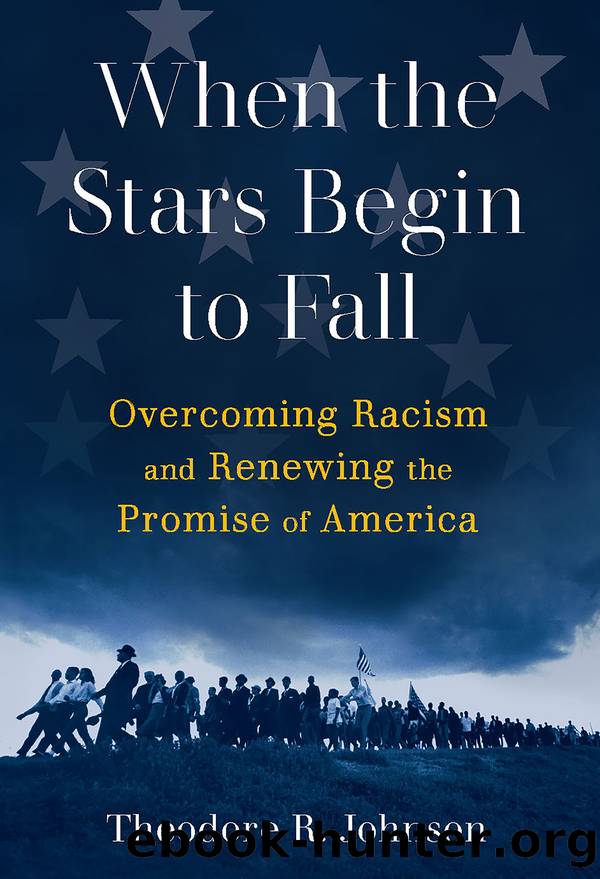When the Stars Begin to Fall by Theodore Roosevelt Johnson III

Author:Theodore Roosevelt Johnson III
Language: eng
Format: epub
Publisher: Grove Atlantic
Published: 2021-05-17T20:06:36+00:00
The problems with civil religion become obvious rather quickly. It can begin to smell like an oppressive nationalism that denigrates all who are not blessed enough to be included in the collective, membership in which is usually based on an arbitrary standard. It also immediately brings to mind the violence and oppression that has been carried out in the name of religion. After all, chattel slavery and racial segregation were often pitched as the divine plan of a Christian God. The Ku Klux Klan buried its racism in a disfigured version of Christian morality, and prominent nineteenth-century South Carolina politician James Henry Hammond justified enslavement on the floor of the U.S. Senate by asserting, âOur slaves are black, of another and inferior race. The status in which we have placed them is an elevation. They are elevated from the condition in which God first created them, by being made our slaves.â198 Terrorists using the Islamic religion as a justification for violence have become a central focus for twenty-first-century national security and foreign policy strategies. History is littered with examples of people using religious beliefs and practices to destroy, oppress, or control others. And religion has also been used to establish divisive societies in which believers are virtuous and all others are inferior and unworthy. If civil religion is just another axis on which a people orient their denigration of others, then not only is it wholly inappropriate and ill-suited for national solidarity; it condones nations exercising their worst impulses and excuses any negative effects that result.
Concerns about civil religion are warranted. We have seen its negative potential in action. In those moments when the security of the United States is threatened, adherence to the tenets of civil religions spikes. In the last century alone, the bombing of Pearl Harbor, the threat of nuclear conflict during the Cold War, major wars waged in far-flung corners of the globe, the September 11 terrorist attacks, and, to some extent, the coronavirus pandemic of 2020 all elicited a national pride akin to religious zeal that swept over the country. In the face of grave danger and challenges to the national narrative and identity, Americans united and found solidarity. This civil religious zeal continued in the wake and aftermath of these dire threats, lending purpose to all the sacrificesâin terms of not only lives disrupted but also lives lostâof citizen exemplars proffered in exchange for the nationâs life and well-being. It, as religions often do, helped people make sense of the inexplicable while also adding another chapter on virtue and bravery to the national narrative and identity.
However, in each of those moments of civil religious devotion, oppression of those labeled as less American continued apace. Japanese Americans were interned by order of President Franklin Roosevelt, and the action was upheld by the Supreme Court. Americans, including civil rights leaders, were accused, excoriated, and ostracized for purportedly supporting communism during the Cold War without any proof. Muslim Americansâeven people whom others mistook for Muslimsâwere assaulted and
Download
This site does not store any files on its server. We only index and link to content provided by other sites. Please contact the content providers to delete copyright contents if any and email us, we'll remove relevant links or contents immediately.
Blood and Oil by Bradley Hope(1558)
Wandering in Strange Lands by Morgan Jerkins(1419)
Ambition and Desire: The Dangerous Life of Josephine Bonaparte by Kate Williams(1386)
Daniel Holmes: A Memoir From Malta's Prison: From a cage, on a rock, in a puddle... by Daniel Holmes(1332)
Twelve Caesars by Mary Beard(1313)
It Was All a Lie by Stuart Stevens;(1295)
The First Conspiracy by Brad Meltzer & Josh Mensch(1167)
What Really Happened: The Death of Hitler by Robert J. Hutchinson(1159)
London in the Twentieth Century by Jerry White(1145)
The Japanese by Christopher Harding(1131)
Time of the Magicians by Wolfram Eilenberger(1125)
Twilight of the Gods by Ian W. Toll(1117)
Cleopatra by Alberto Angela(1094)
A Woman by Sibilla Aleramo(1092)
Lenin: A Biography by Robert Service(1074)
John (Penguin Monarchs) by Nicholas Vincent(1068)
The Devil You Know by Charles M. Blow(1024)
Reading for Life by Philip Davis(1023)
The Life of William Faulkner by Carl Rollyson(983)
